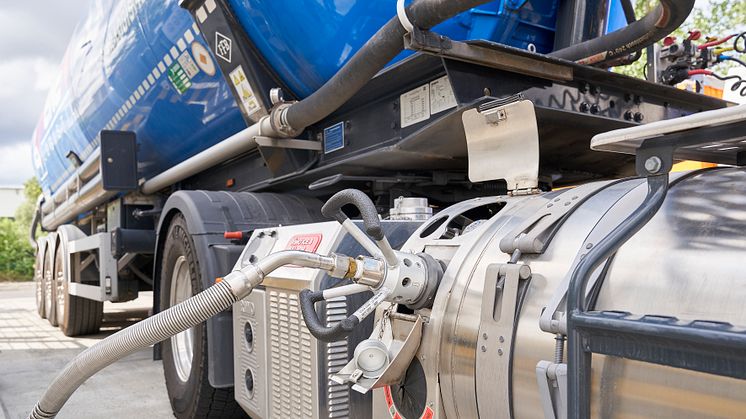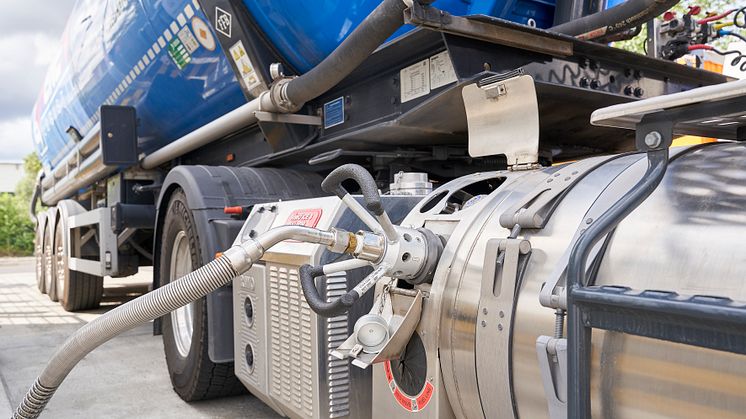
Pressemitteilung -
Sustainable Fuel for Heavy-Duty Trucks – Bio-LNG Gaining Ground Despite Political Hurdles
- Bio-LNG dominates the market: 98 percent of total LNG sales in the first half of 2025 came from renewable sources
- Inadequate political framework hampers fleet transition and climate neutrality in the transport sector
- Kehler: “Bio-LNG reduces emissions – but the toll remains as high as for diesel trucks. Politics is leaving functioning solutions behind.”
Bio-LNG, liquefied biogas, has almost completely displaced fossil LNG in heavy-duty transport: 98 percent of all LNG sold at German filling stations in the first half of 2025 came from renewable sources. This climate-friendly fuel now dominates the market – a milestone for the energy transition in the transport sector. The infrastructure is also keeping pace: With more than 190 filling stations, Bio-LNG is now available nationwide in Germany. However, despite the growing infrastructure and considerable GHG savings, this success is at risk – due to inadequate political conditions.
At the same time, sales are falling short of their potential. In the first half of this year, 85,917 tonnes of LNG were sold – a stagnating trend compared to the same period last year. In the first half of 2024, LNG sales still stood at just over 90,000 tonnes. Yet the climate balance sends a clear message: More than 230,000 tonnes of CO₂ equivalents were saved in the first six months of the year thanks to the use of Bio-LNG instead of diesel. Despite these achievements, there is still a lack of reliable political framework conditions to fully tap into the existing potential.
"The freight forwarding industry is ready to invest in sustainable propulsion – but it needs planning certainty and finally equal treatment with other climate-neutral drives," says Dr. Timm Kehler, CEO of the German Gas and Hydrogen Association. “Policymakers can no longer stand by idly while functioning, climate-friendly solutions with local value creation are being sidelined.”
The industry association particularly criticizes the current toll regulations. Kehler: “It is hard to justify that Bio-LNG trucks, despite operating with almost zero emissions, pay the same toll as fossil diesel vehicles. If the climate-friendly transformation of heavy-duty transport is to be taken seriously, fair conditions must be created.” A targeted toll reduction or exemption for low-emission vehicles would be an effective instrument to accelerate the ramp-up. In addition, tax incentives for biofuels – such as those available for battery-electric vehicles – are completely lacking so far. This remains a major obstacle for investment decisions in the logistics sector.
The association also sees an urgent need for action at the European level. The regulation of CO₂ fleet limits focuses exclusively on battery and hydrogen-electric drives. The contribution of renewable gaseous fuels such as Bio-LNG to emissions reduction has not been adequately taken into account in current policy frameworks. A technology-neutral approach is necessary to reflect the actual carbon footprint in vehicle assessments.
The association also calls for further development of the greenhouse gas reduction quota and a clear political perspective for biofuels. “We are not talking about synthetic fuels, whose energy balance is still being debated – we are talking about thousands of tonnes of real, existing products from German farmers and clear value creation in rural areas,” says Kehler. For German producers, a more ambitious GHG quota beyond 2030, combined with a long-term, moderate support framework, would secure investments and support market ramp-up.
“Anyone ignoring Bio-LNG is overlooking a functioning climate solution for the transport sector. And let’s not forget: Bio-LNG is produced almost exclusively by domestic producers in rural areas – given our ambitious climate goals and the clear desire for greater energy independence, this solution for heavy-duty transport must not be neglected,” Kehler warns. “The industry has delivered – but politics remains too passive. Those serious about climate targets and resilience in heavy-duty transport must act now.”
Kategorien
Als Stimme der Branche bündelt der Verband DIE GAS- UND WASSERSTOFFWIRTSCHAFT e.V. die Interessen seiner Mitglieder und setzt sich dafür ein, dass die Potenziale von Wasserstoff und seiner Derivate sowie Biogas und Erdgas inklusive der dazugehörigen Infrastruktur genutzt werden. Zudem informiert er über die Chancen, die gasförmige Energieträger für ein klimaneutrales als auch resilientes Energiesystem bieten, und treibt die Transformation der Branche hin zu neuen Gasen voran. Der Verband wird von führenden Unternehmen der Energiewirtschaft getragen und umfasst die gesamte Wertschöpfungskette von Produktion, Transport, Verteilung bis hin zu Handel, Vertrieb und Anwendungen. Weitere Branchenverbände und Industrieunternehmen unterstützen ihn als Partner.


